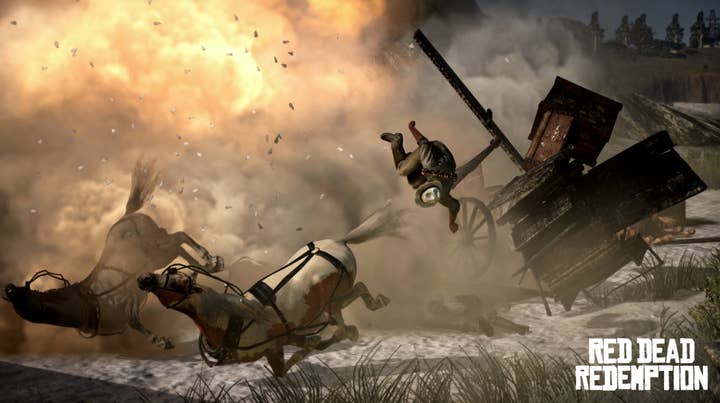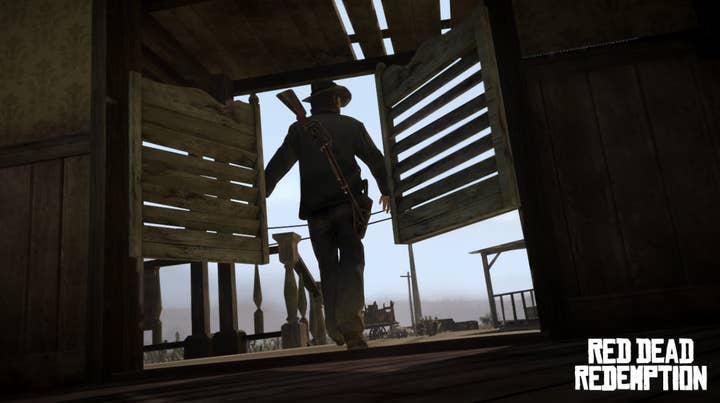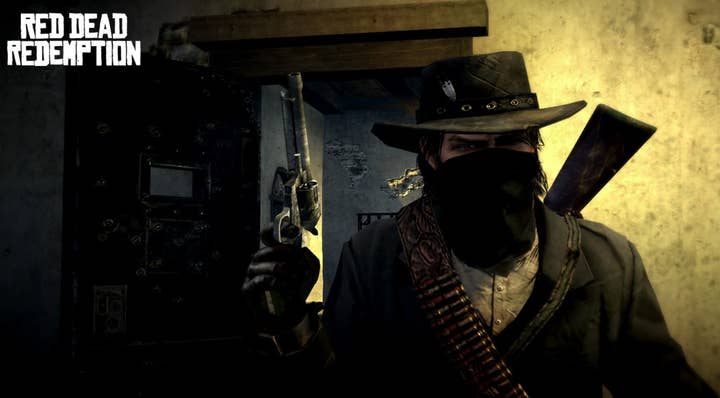Rockstar Spouse and the slow change of culture
10 Years Ago This Month: Red Dead Redemption and its sequel both had crunch controversies, but the studio's reactions show some change in thinking
The games industry moves pretty fast, and there's a tendency for all involved to look constantly to what's next without so much worrying about what came before. That said, even an industry so entrenched in the now can learn from its past. So to refresh our collective memory and perhaps offer some perspective on our field's history, GamesIndustry.biz runs this monthly feature highlighting happenings in gaming from exactly a decade ago.
Rockstar Spouse Redemption?
It's been 10 years since Rockstar Spouse, an open letter signed by the "Determined Devoted Wives of Rockstar San Diego employees" that blasted the company's excessive crunch culture. It was released after the Red Dead Redemption studio had been crunching hard for about nine months on the game, with another three months to go before launch.
I talked about Rockstar Spouse and Red Dead Redemption's tortured development in this column last year, on the anniversary of Take-Two delaying the game for "additional polish." This time around, I'd like to focus on the reaction to Rockstar Spouse.

It took Rockstar two weeks to actually address the incident, and when it did, it was not in a widely issued statement but in a fan Q&A session for the game on its official site (long since taken down, naturally). It also described the controversy not as one stemming from its employees' families but "stories spreading around the internet… a case of people taking the opinions of a few anonymous posters on message boards as fact."
"We're saddened if any former members of any studio did not find their time here enjoyable or creatively fulfilling and wish them well with finding an environment more suitable to their temperaments and needs, but the vast majority of our company are focused solely on delivering cutting edge interactive entertainment," Rockstar said.
To me that translates as, "Most of us care about making a great game and are fine with this crunch, but hey, if they weren't tough enough for that, we didn't want them here anyway." There was no apology, no acknowledgement that there was a problem, and no suggestion that things needed to change. Clearly there was no intention on the part of management to meaningfully reduce crunch at Rockstar.
"While I had massive pride for what the studio had achieved... I also felt incredibly guilty for how we just kept doing the excessive hours, how I failed to change that pain for the team"
Ex-Rockstar Lincoln studio head Mark Lloyd
In early 2018, with Red Dead Redemption 2 on the way later in the year, I asked Take-Two CEO Strauss Zelnick what had been done to make sure the sequel to the game didn't also produce a sequel to Rockstar Spouse, and his response suggested that management's attitude toward crunch had changed very little in the eight years since Rockstar Spouse.
"We have a hard-working company," Zelnick said. "It's a privilege to work at our company and our labels. And I believe that our work practices are sound and appropriate. It is a very busy time, but it's a time that people are anxious to participate in. And I stand behind it."
Zelnick's unfortunate (or perhaps honest) choice of the word "anxious" aside, by all accounts there have always been people at Rockstar actually eager to crunch. It's part of the company culture, as former Rockstar Lincoln head Mark Lloyd wrote in an editorial for us last year.
As Rockstar's primary QA studio, Lincoln has been notorious for crunch. Lloyd traced its appetite for excessive work hours back to the 9/11 attacks, when an understandably shaken Rockstar New York team needed extra help finishing up Grand Theft Auto III. It was the first blockbuster in a string of huge hits for Rockstar, and the Lincoln studio would crunch progressively harder with each new game. After Grand Theft Auto: San Andreas, Lloyd knew he would have some regrets about his time atop the studio. By the time crunch had wrapped on Red Dead Redemption, he couldn't bear it any longer.
"I left Rockstar Lincoln after Red Dead Redemption, in 2011," Lloyd wrote. "I couldn't and didn't want to do this anymore. For three months, I sat at home as I went through my notice period with Rockstar, and it felt like grieving. Was I feeling sorry for myself at that point? Maybe… But I'd spent the last 12 years with a team that were my friends -- more than that -- and while I had massive pride for what the studio had achieved and the titles we had worked on, I also felt incredibly guilty for how we just kept doing the excessive hours, how I failed to change that pain for the team."
Lloyd went on to say he still feels bad about his time at Rockstar Lincoln, and has largely disconnected from the people he once felt so close to and endured so much with. He now works as a consultant, and has written a book about eliminating crunch and ethical software development.
This is the thing about workplace culture; it takes more than one person to fix, even if it's the head of the studio. After all, a studio head fed up with the norm might have more influence than a random QA employee, but the studio head is also more likely to have the wherewithal to leave, to find a position with a studio that already reflects their new mindset, or to start their own rather that stay and fight an ingrained culture. Because it is a fight to change a culture.
It takes an acceptance that the old way was flawed and a collective will to change the established patterns, even when those patterns have produced success in the past. In the wake of Rockstar Spouse, Rockstar and Take-Two didn't seem to have that acceptance, much less the will to act on it.

Recently at least, there have been some slight signs of change. Just before Red Dead Redemption 2 launched, Kotaku published a report based on accounts of dozens of current and former Rockstar employees in which Rockstar director of publishing Jennifer Kolbe conceded that crunch isn't sustainable, and that the studio has been changing its practices. Mild as that is, it's far more acknowledgement of the problem than the company was admitting to over the previous decade. Last year it also reportedly moved a number of its Rockstar Lincoln QA contractors to full-time employees.
Leaders ultimately get the credit or blame for studio culture, but improvements can often be traced to those with less power
So how does change happen? How does a studio with a crunch problem turn it around? When the question of culture comes up, we generally hold leadership accountable. After all, they're in charge. They set the tone, the drumbeat that everyone else will march to. But when it comes to culture change, I don't think it's likely to start with the leadership very often. After all, they set it in the first place, or at the very least were well-adapted to it. Even when leadership has a change of heart -- as Lloyd did after a dozen years with Rockstar Lincoln -- can they act on it? Do even they have the autonomy to impose changes, the security to rock a successful boat, and the energy to fight against the existing studio culture?
These cultures can and do change, but what we've seen is that these changes most often come from the bottom up. As Kolbe told Kotaku, "We're dealing now with the generation after mine. They have very different ideas about work-life balance than my generation has, and they are bringing that into the company, and I think that's a positive thing. They probably think we're all crazy, but I think it actually has changed our ideas of how you can work."
Whatever cultural improvements are being made on this front, they are ultimately being made because developers have decided that the status quo was unacceptable and acted on that determination. Whether they push internally for change, openly advocate for it to the wider industry, refuse to work for abusive employers, support unionization, or go public to let others know how bad a situation has become, it seems as if the rank-and-file developers in the industry are finding a voice they haven't often had in the past.
If you need a bit of optimism heading into 2020 -- and I absolutely do considering the "Trends for You" section on my Twitter feed as I write this is exclusively variations on World War III hashtags -- here's hoping the prospect of increasing cultural change from the bottom-up does the trick.
Good Call, Bad Call
GOOD CALL: Analyst Jesse Divnich (then with EEDAR) predicted that Nintendo would launch a successor to the DS within 15 months. The 3DS would launch 13 months later in February of 2011. (For more current predictions from Divnich, check out our round-up of analyst expectations for 2020.)
BAD CALL: Microsoft's VP of games and future head of Xbox Phil Spencer talked about the company's upcoming Project Natal motion-sensing camera (which would be named Kinect for its debut later in 2010), likening its projected evolution to that of the Xbox Live online multiplayer service.
"At the beginning of Live it was all about sports, racing and shooting games," Spencer said. "Now if you found a game that didn't have some kind of Live functionality it would seem like it wasn't a complete game. I think Natal is likely to get there as well."
Kinect was plenty successful for Microsoft, but the company never did figure out compelling ways to incorporate it into the AAA games it built the Xbox platform around. It was discontinued in 2017 and while publishers still catch flack for releasing seemingly incomplete games, it's not on account of Kinect compatibility.
GOOD CALL: In the wake of EA paying at least $300 million to acquire social game developer Playfish, former Xbox Live Arcade games portfolio manager David Edery weighed in on the rush to get into Facebook gaming, saying, "The traditional publishers will end up wasting quite a lot of money in the process…"
BAD CALL: Edery unfortunately kept talking, finishing that sentence with, "…but some of them will ultimately succeed at entering the market." Alas.
GOOD CALL: Nintendo finally committed to getting Netflix on the Wii in 2010.
BAD CALL: Netflix is still AWOL on the Nintendo Switch in 2020.
GOOD CALL: Reggie Fils-Aime says the Wii still has a very long life ahead of it. Nintendo would stop publishing new games for it after the September 2012 debut of Kirby's Dream Collection (and realistically the last major first-party game for it was 2011's The Legend of Zelda: Skyward Sword), but third-party publishers would do a much better job of keeping the system technically alive, with franchises like Disney Infinity and Skylanders seeing new releases on Wii for years afterward. In fact, Ubisoft released Just Dance 2020 on the system just two months ago, some 13 years after the Wii itself launched in 2006.
GOOD CALL: Microsoft was singing the same tune about the Xbox 360, with senior director of Xbox product management David Hufford saying the console that arrived in late 2005 may not even be halfway through its lifecycle. The Xbox 360's last stand-alone titles appear to have been 2018's iterations of FIFA and Just Dance, giving the 2005 console a 13-year lifespan comparable to that of the Wii.
BAD CALL: MTV Games executive Paul DeGooyer put a happy face on the rhythm game bubble bursting, saying it was only because the market for peripherals was saturated and that the market had "cooled substantially, but it's not as steep a decline as you might think." Sure, there's lots of wiggle room there because the perceived decline of the genre varies from one person to the next, but when both the Guitar Hero and Rock Band franchises and all their spin-offs would wind up mothballed at the end of 2010, it's safe to say the rhythm game doomsayers were not exaggerating the problem.
BAD CALL: In his weekly radio and TV show, Venezualan president Hugo Chavez made outrageously wrong-headed remarks about games, saying "These games they call PlayStation are poison. Some games teach you to kill," and adding that games "promote the need for cigarettes, drugs and alcohol so they can sell them. That's capitalism - the road to hell."
I don't have to tell you how absurd this is. I mean, it just doesn't hold up to the slightest scrutiny. As any gamer can tell you, there's nothing uniquely dangerous about PlayStation games compared to Xbox or Nintendo titles. Utter nonsense.
GameStop's Plan to Survive Digital
GameStop COO J. Paul Raines talked about how the retailer would cope with the industry's shift to digital distribution, saying, "The only way a company like ours survives is being dedicated to the category."
A few years later, Raines spearheaded a GameStop 3.0 strategy built on aggressively diversifying its business beyond the core gaming category. That approach didn't stick either, as last year GameStop sold off its mobile phone business to instead embrace "an increased focus on the video game industry and the rapidly growing collectibles space."
Normally this is where I'd poke fun at them for wasting a decade going in circles, but I don't have a great suggestion off the top of my head as to what GameStop reasonably should have done a decade ago to avoid its current struggles. The publishers and platform holders were always going to push for digital to cut out middlemen, pirates, rentals, and second-hand sales. GameStop might have postponed the shift a while by not antagonizing the publishers or cutting them in on a slice of the used revenues, but the writing was on the wall that used to be PSP games but now is just Funko Pops.
What Else Happened in January 2010?
● The global economic downturn saw the 2009 US retail gaming market drop 8 percent year-over-year as ESA president Michael Gallagher explained, "Clearly, 2009 was [a] tough year for consumers and the national economy." However, there was optimism heading into 2010 thanks to a combination of record December sales results and anticipated revenue drivers like the Kinect and Sony's Move motion controllers. Anyone paying attention to the mobile market (not reflected in the above sales figures) was likely more bullish on account of the iPhone's continued success and the growing hype for its next big thing.
● That next big thing from Apple turned out to be the iPad, and while it would go on to cement a whole new category of mobile device in the market, it's worth remembering that the initial reaction was not one of unanimous enthusiasm. The cracks about Apple's tablet were so pervasive that even Nintendo president and widely beloved industry nice guy Satoru Iwata got in a dig to the New York Times, minimizing the device as "a bigger iPod Touch."
● Near Death Studios was closer to death than advertised, as the Meridian 59 developer announced its closure. While the influential MMO was no longer a viable business, the demise of Near Death didn't resign it to the trash bin of history that will eventually claim so much of the modern industry. Instead, the game was sold back to its original creators -- Andrew and Chris Kirmse -- who made it open source and let it run as a free-to-play game supported entirely by donations. It remains online to this day. A decade later, it's a shame more decommissioned online games haven't followed suit.
● Here's a press release for the Trump Tycoon mobile game that launched 10 years ago. It says working for Donald Trump is a dream job, and notes that he "certainly has a loyal following," which reads a lot differently these days.

